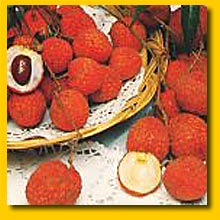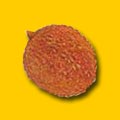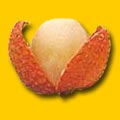|
Jul. 14, 2025
|
 Food Uses Lychees are most relished fresh, out-of-hand. Peeled and pitted, they are commonly added
to fruit cups and fruit salads. Lychees stuffed with cottage cheese are served as salad
topped with dressing and pecans. Or the fruit may be stuffed with a blend of cream cheese
and mayonnaise, or stuffed with pecan meats, and garnished with whipped cream. Sliced
lychees, congealed in lime gelatin, are served on lettuce with whipped cream or mayonnaise.
The fruits may be layered with pistachio ice cream and whipped cream in parfait glasses,
as dessert. Halved lychees have been placed on top of ham during the last hour of baking,
or grilled on top of steak. Pureed lychees are added to ice cream mix. Sherbet is made by
extracting the juice from fresh, seeded lychees and adding it to a mixture of prepared
plain gelatin, hot milk, light cream, sugar and a little lemon juice, and freezing.
Lychees are most relished fresh, out-of-hand. Peeled and pitted, they are commonly added
to fruit cups and fruit salads. Lychees stuffed with cottage cheese are served as salad
topped with dressing and pecans. Or the fruit may be stuffed with a blend of cream cheese
and mayonnaise, or stuffed with pecan meats, and garnished with whipped cream. Sliced
lychees, congealed in lime gelatin, are served on lettuce with whipped cream or mayonnaise.
The fruits may be layered with pistachio ice cream and whipped cream in parfait glasses,
as dessert. Halved lychees have been placed on top of ham during the last hour of baking,
or grilled on top of steak. Pureed lychees are added to ice cream mix. Sherbet is made by
extracting the juice from fresh, seeded lychees and adding it to a mixture of prepared
plain gelatin, hot milk, light cream, sugar and a little lemon juice, and freezing.
Peeled, seeded lychees are canned in sugar sirup in India and China and have been exported from China for many years. Browning, or pink discoloration, of the flesh is prevented by the addition of 4% tartaric acid solution, or by using 30° Brix sirup containing 0.1% to 0.15% citric acid to achieve a pH of about 4.5, processing for a maximum of 10 minutes in boiling water, and chilling immediately.
*According to analyses made in China, India and the Philippines.
The lychee is low in phenols and non-astringent in all stages of maturity. To a small extent, lychees are also spiced or pickled, or made into sauce, preserves or wine. Lychee jelly has been made from blanched, minced lychees and their accompanying juice, with 1% pectin, and combined phosphoric and citric acid added to enhance the flavor. The flesh of dried lychees is eaten like raisins. Chinese people enjoy using the dried flesh in their tea as a sweetener in place of sugar. Whole frozen lychees are thawed in tepid water. They must be consumed very soon, as they discolor and spoil quickly. Other UsesIn China, great quantities of honey are harvested from hives near lychee trees. Honey from bee colonies in lychee groves in Florida is light amber, of the highest quality, with a rich, delicious flavor like that of the juice which leaks when the fruit is peeled, and the honey does not granulate.Medicinal UsesIngested in moderate amounts, the lychee is said to relieve coughing and to have a beneficial effect on gastralgia, tumors and enlargements of the glands. One stomach-ulcer patient in Florida, has reported that, after eating several fresh lychees he was able to enjoy a large meal that, ordinarily, would have caused great discomfort. Chinese people believe that excessive consumption of raw lychees causes fever and nosebleed. According to legends, ancient devotees have consumed from 300 to 1,000 per day.In China, the seeds are credited with an analgesic action and they are given in neuralgia and orchitis. A tea of the fruit peel is taken to overcome smallpox eruptions and diarrhea. In India, the seeds are powdered and, because of their astringency, administered in intestinal troubles, and they have the reputation there, as in China, of relieving neuralgic pains. Decoctions of the root, bark and flowers are gargled to alleviate ailments of the throat. Lychee roots have shown activity against one type of tumor in experimental animals in the United States Department of Agriculture/National Cancer Institute Cancer Chemotherapy Screening Program.
For more information about our company and product lines, please go to:
www.iTitropicals.com.
Also, for detailed information on samples and
specifications please visit
www.iTitropicalscom.
| |||||||||||||||||||||||||||||||||||||||||||||||||||||||||||||||||||||||||||
| Voice: +1 609 987 0550 | Copyright 2025, iTi Tropicals, Inc. |
Fax: +1 609 482 4333 |



